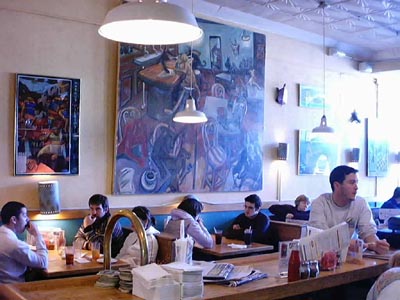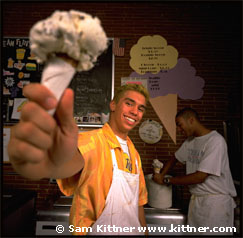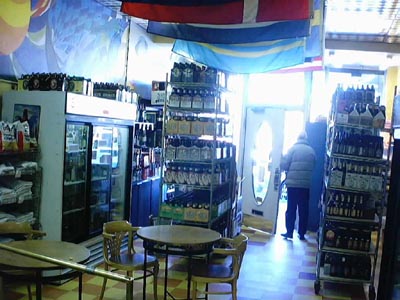Another reason why independent retail is tough in the city
 Dining Room, Lost Dog Cafe, Arlington. (Photos from their website.)
Dining Room, Lost Dog Cafe, Arlington. (Photos from their website.)The regulatory regime makes things very difficult. E.g.,
- If you want to make ice cream on your premises, that's considered manufacturing, so the license fee is $1,800 for two years. In Montgomery County, the fee is $300 for two years, and while Montco doesn't have tons of independent ice cream retailers because it's a difficult place for independents to thrive, given the dominant autofied retail environment there, there are independents. I can think of a couple in the District (Larry's on Connecticut, Thomas Sweet in Georgetown). Otherwise you have chains, or resale of ice cream produced by others.
 What neighborhood wouldn't want a place to walk to in their own neighborhood, just like Arlington's Lazy Sundae in Clarendon? Photo copyright by Sam Kittner.
What neighborhood wouldn't want a place to walk to in their own neighborhood, just like Arlington's Lazy Sundae in Clarendon? Photo copyright by Sam Kittner. Ironically, while Post columnist Marc Fisher, in his blog, hails the Lazy Sundae, he crows over the opening of a Carvel Ice Cream Franchise in Columbia Heights... Note the contradiction. Why not the equivalent of a Lazy Sundae in Columbia Heights, or Petworth, or Capitol Hill, etc.?
- If you develop a bakery, unless you locate in an area zoned for "manufacturing" you can't sell wholesale, because of the possible negative impact, even if your space is quite small (under 1,000 feet, etc.). For a small business,it helps to develop multiple revenue streams to increase the likelihood of success, say by selling your great cakes to restaurants. But with the regulations the way they are, the ability to develop such revenue streams is restricted. So then is your ultimate success. Combine this with high rents, high permit costs, etc., and developing independent businesses in DC becomes quite difficult. How many independent bakeries are left in DC--well there's Heller's, Love Bakery, I suppose the Watergate. Clement's left downtown DC years ago. Etc.
The Claremont Institute (when I was in college I never thought I would be quoting favorable from "conservative" think tanks) has an interesting article about this, "Lattes at the Regulatory Cafe," which states:
As the ordinances and laws that affect businesses grow, larger companies that are much better equipped to handle the complexities of these regulations have a decided advantage over smaller, single-store operators. And government leaders at every level—through ever-expanding regulatory, tort, and tax laws—continue to unwittingly shift the advantage to the big players. Any small business owner could explain why.
Even a lemonade stand in Anytown, CA technically requires a business license, a visit from health inspectors, and a permit from the planning commission before it opens. A coffee shop presents a more daunting challenge—there will need to be bathrooms accessible to the handicapped, workplace safety rules posted on the wall, and liability insurance should a customer scald herself on a chai mocha.
"Reducing regulatory costs would help the independent business more than the chain, because it's a bigger percentage of their costs," Southern California economist John Husing said. "Chains can more easily bear high startup costs and short term losses given the staying power their financial resources afford."
- Lost Dog Cafe in Arlington is a pizza and sandwich shop that carries close to 300 beers. They also deliver. But not only do they sell the food for on-premise consumption, the establishment has what in DC we would call a class C liquor license allowing them to sell alcoholic beverages, they also have a Class B license, allowing them to sell packaged beer and wine. So if you try a beer there and you like it especially well, you can also buy it in the packaged area and take it home. Not in DC. This isn't allowed. I don't know why. Whole Foods tried to do this at Tenleytown, but they weren't able to do so. I don't see why not, it's "try it, you'll like it" with the option to buy and enjoy at home.
 Class B package sales area, Lost Dog Cafe, Arlington.
Class B package sales area, Lost Dog Cafe, Arlington.
Today's Guardian reports that the UK Parliament will be releasing a report this week stating that by 2015, unless measures are taken, "the country that Napoleon called a nation of shopkeepers will have only a handful of independent retailers. Unless, that is, the government acts to thwart the power of the supermarkets."
According to the article, this "will be the most high-profile report into the future of the high street for years. Its effect could signal moves by government to halt its decline." (See "High Street, Clone Town, 2015.")
Meanwhile it is (chain) business as usual in DC.



0 Comments:
Post a Comment
<< Home